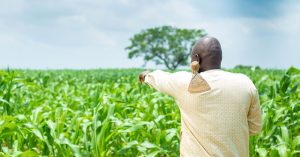Everyone deserves a chance to prosper
Home to Africa’s biggest economy and with a population set to outstrip that of the United States by 2050, Nigeria is bursting with potential. Yet, 1 in 3 people under 30 are unemployed. Adaeze Usoh, who heads the Investor Relations team at Babban Gona, or “great farm” in the Hausa language, tells us what this farmer-focused social enterprise is doing to leverage this potential.
Climate shocks, economic stagnation and social turmoil have too often fuelled displacement across Africa. At Babban Gona, we have spent the last decade working to prevent this by creating job opportunities in sustainable agriculture for people in Nigeria. This way, we interrupt the root causes of violence and stimulate economic growth – so that no one is forced to leave their home.
To date, we have worked with more than 300,000 small-scale farmers, invested US$ 200 million in vulnerable people and created more than 600,000 job opportunities in the agriculture sector. We’re proud to be Africa’s largest maize producer.
As Head of Investor Relations since 2018, I’ve seen the impact Babban Gona has had on Nigeria’s farming communities through creating jobs, strengthening food security and catalysing economic growth across the country.
Powerful partnerships
Babban Gona has gone from strength to strength and our partnerships have played a key role in this. In 2021, a US$ 5 million loan from IFAD—its first ever investment in a private sector company—sparked confidence in other investors. Since then, we’ve received more than double that amount from additional investors, which is helping us expand our outreach to six regions in the country.
Last season, we provided support to over 95,000 small-scale farmers, who cultivated 160,000 acres of land. We trained 138,000 female entrepreneurs on price strategy and how to select the best products and trade locations.
Our partnership with IFAD has also given us the tools to deepen our engagement with women through programmes like the Women Economic Development Initiative, which helps women overcome social barriers and build successful businesses.
IFIs can and should do more

IFIs should work towards providing low-interest loans for rural businesses. © Eric Alaye
There’s no doubt that International Financial Institutions (IFIs), like IFAD, have had a positive impact on the rural private sector, but there is still much work to be done.
They could provide low-interest loans and tailor them specifically to rural businesses, as well as designing other financing solutions that cater to the unique needs of small-scale farmers, while also supporting the deployment of technical expertise to implement these solutions.
IFAD, for example, has invested more than US$ 3 billion in rural finance systems across more than 70 countries. Today, they are leaders in agricultural risk management with programmes like INSURED and Managing Risks for Rural Development.
As well as direct financial contributions, IFIs could invest in rural infrastructure development – like roads and bridges – which is known to improve the overall business environment in rural communities.
These broad actions have big impacts on individual lives. Poultry farmer, Grace Ochiga, used to struggle to make ends meet and provide for her four children after the death of her husband. She joined Babban Gona in 2021 and received 200 birds. Her income grew five-fold to US$ 500 a month.
Thanks to partnerships, like the one we have with IFAD, we can transform the lives of people like Grace. Going forward, we aim to become a top impact-driven business and support those who are most in need, not just in Nigeria, but across the African continent.
AUTHOR
Adaeze Usoh
SOURCE
Originally published on ifad.org
PHOTO
© Eric Alaye